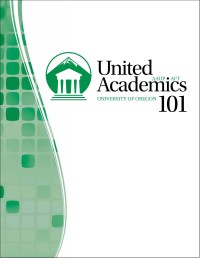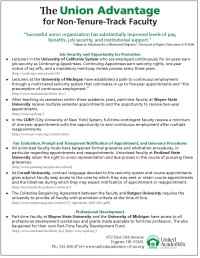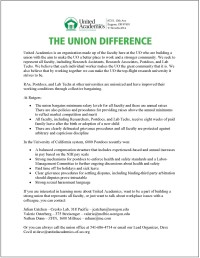Students, faculty, and staff at University of Oregon face an inexplicable double whammy of rising tuition and miserable salaries and wages. While it is true that the Great Recession pummeled state budgets, and consequently budget outlays for public education, the tide of rising tuition and falling salaries preceded the 2007-2009 recession. Adequate explanations – and we do not mean the knee-jerk “blame the public employees” rant – are lacking. Incomes for CEOs, University administrators, and millionaires and billionaires have seen dramatic upward swings, contributing to the highest level of income inequality in the U.S. since 1928, with the top one-percent netting a quarter of the nation’s income. Blaming public employees – including University staff and faculty – works well as a political diversion, but not as an explanation. As faculty at the University of Oregon who support unionizing under United Academics, we invite you to engage in a public dialogue about the attack on higher education.
Many of you may have read the recent reports on faculty salaries from the American Association of University Professors reported in the Chronicle of Higher Education and the New York Times. The trends show stagnating salaries at public universities, a growing gap in pay between private and public institutions, and the erosion of tenure-related hires with a resultant increased reliance on faculty who lack tenure protections. These trends are not always the product of a lack of money, as we know the University of Oregon is flush with reserves totaling $55 million. Rather, a lack of faculty voice in the legislature combined with a lack of imagination for dealing with these challenges is largely to blame. Solutions to these long-term problems will not happen quickly or easily, but surely sitting and waiting for others to decide appropriate action without faculty input is no solution at all.
The attacks on public employees are not just a problem for others in other places. Some of you may have noticed the recent decisions to modify our healthcare benefits as well as pending legislation to dramatically reduce employer contributions to retirement plans. As you read this, at least 26 pieces of legislation that specifically target PERS benefits are on the table in Oregon’s legislature. Elected and administrative officials often face difficult fiscal choices and they often make choices that affect people who have little to no input in those decisions. Having a voice in the process is at the heart of democracy and accountability. Presently, faculty at the University of Oregon have no collective voice in the legislative process. As active members of United Academics, we believe this lack of input is not in our professional or academic interests or in the interests of higher education in this country. Maintaining a vibrant intellectual space at any major university requires input from the faculty. We are the people on this campus in the best position to positively shape our working conditions and our students’ learning conditions. If we do not speak with a strong voice, we will continue to give permission to others to make these vital decisions. A sitting duck will surely be the first to get cut.
Join us on May 24th at Knight Library Browsing Room from 3-5pm to hear more about the attack on higher education. Cary Nelson, the President of the American Association of University Professors will be featured. Recently Professor Nelson remarked on the current attacks on collective bargaining and faculty rights: “Those who care about higher education and academic freedom should spare no effort to defeat these efforts and restore the fundamental right of all employees to organize their voices as they choose” (see back side for more from Professor Nelson). It is incumbent on those of us who retain our right to organize our voices to exercise that right. Faculties across the country are fighting to keep their voice and their ability to have meaningful input into how their university confronts the challenges they face. It is time for the faculty at the University of Oregon to exercise our rights and raise our collective voice for the betterment of profession, institution, and the education of our students.





